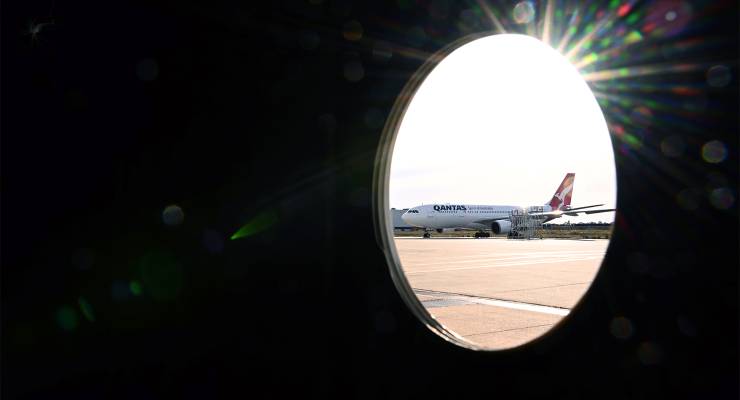
For those of us with a disability, Australian airports appear to not give a lot of consideration to our accessibility needs, and the final report and recommendations tabled last month by the Royal Commission Into Violence, Abuse, Neglect and Exploitation of People With Disability suggest we are being left behind, as does my personal experience.
I came head to head with some of these failings while travelling interstate recently on work, after my medical device triggered security screening processes at Melbourne Airport. The experience left me feeling dehumanised, and I was completely unprepared for such treatment.
The disability royal commission, which was established in August 2019, held two workshops with members of the disability sector to discuss the breadth of issues within aviation industries faced by passengers with accessibility needs.
The process uncovered reports that people with disability “often encounter inaccessible facilities and services at airports and face unhelpful practices and systems adopted by airlines”.
These concerns were raised with the CEOs of airlines and airport facilities in February 2023 in a letter sent by the royal commission’s chair, Ronald Sackville.
When I approached the airport about my experience, its head of community engagement Andrew Lund said that “airport screening processes are dictated to by the Department of Home Affairs”.
Later Lund told Crikey: “Home Affairs prescribes what processes are carried out and how airports should go about them. There are various subsections that deal with different categories of passengers that may have special circumstances.”
He acknowledged Melbourne Airport had become “increasingly aware that it can be more difficult than it should be for passengers with special needs”: “The letter sent by Ronald Sackville in February really just solidified these concerns.”
Melbourne Airport is undertaking a full review of its accessibility requirements led by consultancy firm Get Skilled Access — founded by Dylan and Zack Alcott, who were unable to comment by time of publication.
Lund said: “It is a really tricky environment because it is so regulated, but we think there is scope for improvements. Certainly, in our discussions with Home Affairs we’ve expressed that there is room for change.”
He also admitted it’s a tricky question to answer without “the security clearance needed to view the document that prescribes what [Melbourne Airport] need to do”.
Despite these issues and the correlations with reports from the disability royal commission, the Attorney–General’s Department told Crikey it “would not be making a comment on airport security matters in this instance”.
In May 2022, former disability discrimination commissioner Graeme Innes called out Adelaide Airport security, describing his experience as “humiliating” and “distressing” and later tweeting “that he was ready to go to court if necessary”. He claimed that after his assistance dog’s metal harness had triggered security alarms, he was treated to overzealous search methods.
Even before the disability royal commission began, it was nothing new for members of disability communities to report less-than-perfect experiences travelling through Australian airports.
A Home Affairs spokesperson would not comments on the findings of the disability royal commission: “The department consults with a range of organisations regarding security screening procedures to ensure that they don’t hinder a person’s access to aviation transport.”
These organisations include the Australian Network on Disability, Pride in Diversity, Autism Spectrum Australia (Aspect), Assistance Dogs Australia and the Australian Human Rights Commission (AHRC).
It added that it was aware of and supports the Department of Infrastructure, Transport, Regional Development, Communication and the Arts “disability access facilitation plans”, which are intended as a framework for operators to develop ways to communicate to the travelling public “the availability and accessibility of services for passengers with disability”.
When approached by Crikey, the department confirmed it was hastily conducting a review of information on its website. By time of publication, it notified Crikey via email that all information relating to disability access facilitation plans across Australian aviation providers on its website was now true and correct.
Have you suffered humiliating treatment at an Australian airport? Let us know by writing to letters@crikey.com.au. Please include your full name to be considered for publication. We reserve the right to edit for length and clarity.








The baseline is that Australian business is simply terrible at accommodating accessibility issues.
One in six has hearing issues, yet companies will often only provide telephone contact and support. Today I had yet another case of writing to a large business and asking them to contact me via email, SMS or captioned call – and they telephoned me to discuss the issue.
It’s even difficult to reach healthcare services at hospitals, medical centres, pathology testing labs unless you work through the National Relay Service which is totally unreasonable in an emergency or where you are going to be stuck on hold for half an hour or have the phone ring out.
As Australia’s population ages this is going to get worse. However I’ve also realised that the poor literacy of Australians means that frontline staff are often uninclined or incapable of communicating in writing with customers.
Hear, hear (pun intended). The virtual impossibility of getting anything in writing is a pain and I suspect that the reason advanced in the last para is spot on.
I’d propose it has more to do with not wanting anything in an easily recorded, referable and reproducible form that isn’t controlled by the organisation.
Sounds like you’ve lived in France. Getting anything like that from government employees is next to impossible.
Poor literacy by what metric and comparison ? The OECD doesn’t seem to think we’re any worse than comparable countries (and the younger demographics are generally better).
Government stats indicate about half the adult population is functionally illiterate. You can get a university degree without advancing your reading age beyond early high school.
Compsrisons with other countries are irrelevant to the situation.
It’s the frontline security staff who, by and large, if it were not for Osama bin Laden and the LNP’s Border Force (aka Men In Black), would be in the long term unemployed bracket. Passing through an airport is tiresome, noisy, sweaty, ridiculous, time-consuming and temper-fraying. The low-paid staff can easily make it also uncomfortable and embarrassing in their fraught workplace if they see disabled people as a nuisance. Any job which involves forcing people to do what they would rather not attracts a certain percentage of psychopaths, or trains employees to be so. I don’t know why, but our official society is more interested in making people unhappy, rather than happy. So strange. And we seem unable to fight back by simply refusing.
Sorry non de plume. I travel in an electric wheelchair probably every two weeks from Melbourne and have found the security staff and ground crew from Virgin and Rex staff amazingly accommodating and seemingly interested in how my journey from check in, through security, onboarding and the flight experience itself as easy as possible. Sure, one or two guys on a power trip but compared to some of the self-entitled ‘Karen behavior I’ve seen some people with impairments inflict upon lowly paid staff. they are amazingly tolerant. Perhaps its a case of if you treat people like shit, they tend to respond in a similar vein.
Then I have to retract my comment, and glad to do so. I apologise to those I may have wrongfully offended.
Security people generally, like the police, prison guards and soldiers, tend to be conservative and come with a bundle of troublesome attitudes to minorities or anyone who is not like them. In addition they are, as stated elsewhere in these comments, low paid, casualised and have awful managers who make difficult situations worse.
Australian airports are barely accessible for people without disabilities, let alone those with! The domestic airport at Sydney has a single, tiny lift wedged into a difficult to access alcove for passengers with luggage trolleys, children and wheelchairs to share. Many of the footpaths outside the terminal are littered with posts and advertising bollards which prevent trolleys passing.
My friend’s QantasLink flight from Hervey Bay to Brisbane this morning took off later than scheduled while 4 wheelchair-using passengers were individually assisted onto the plant before anyone else boarded.
I assume that at Brisbane, all other passengers departed the plane before wheelchair-using passengers werfe assisted from the plane.
My day-to-day difficulty is the acceptance of a service dog in all environments. Organising a flight anywhere within Australia is difficult. Each airline has its own application and approval paperwork. The paperwork must be supported by your trainer/organisation, which means you cannot access cheap flights if you don’t get approval in time. You cannot access emergency flights without much drama or extra stress.
Public transport in NSW requires a permit from Transport NSW. The paperwork is over the top. The submission includes lots of paper, including the requirement of a medical certificate to state you have a disability. In truth, under the ACT, they should accept the dog certification already issued. The complaint that my certification should have been accepted and I should have been provided a pass without completing the entire certification paperwork to Transport NSW was met with silence from the Minister at the time.
Hotels and Motels are ignorant of your rights to accommodation and often make the booking experience unpleasant to deter the booking.
Recently, a major hire car company staff member would not accept that I am not required to pay for cleaning my hire because of the dog. Even in their terms and conditions of hire, assistance animals are excluded from a cleaning fee.
Booking accommodation through gig sites is fraught with difficulty and challenges from people listing their places on the site.
Going to restaurants, cafes, and other venues is also a challenge, with some wanting to put you outside because of your dog.
There are, of course, the people who love dogs or are welcoming to us, and she does cheer up some places we get to wait, like the doctor’s surgery area, by being there. Educational areas are also welcoming regardless of whether they are government or private-run. Larger shopping precincts are also more welcoming than small stores.
Education to remove discrimination is the key to solving a lot of issues. Still, you will never get rid of that horrid feeling of not being accepted because they dislike animals in their setting.
Like all the others, my assistance dog is highly trained to do their job and has extensive training to enable freedom for the person they are supporting to go everywhere with them. Their medical / health requirements are kept at a very high standard. They have special certification provided by an authorised authority to maintain the highest standards. But this is just not always enough.
“The paperwork is over the top. The submission includes lots of paper, including the requirement of a medical certificate to state you have a disability”
Unlike say the UK where zero paperwork is required for any companion animal (dog, cat, ferret) on public transport.
I was going to volunteer my dog for hospital visits, but the costs of certification and paperwork involved were just too ridiculous to make it possible.
You’re also going to encounter a lot of frontline staff who have had no training and find it easier to say no to everything. Their management will never support them.
There’s basically a self-supporting certification industry in Australia for animals and humans. If you query any part of it then you’re querying the existence of many vested interests.